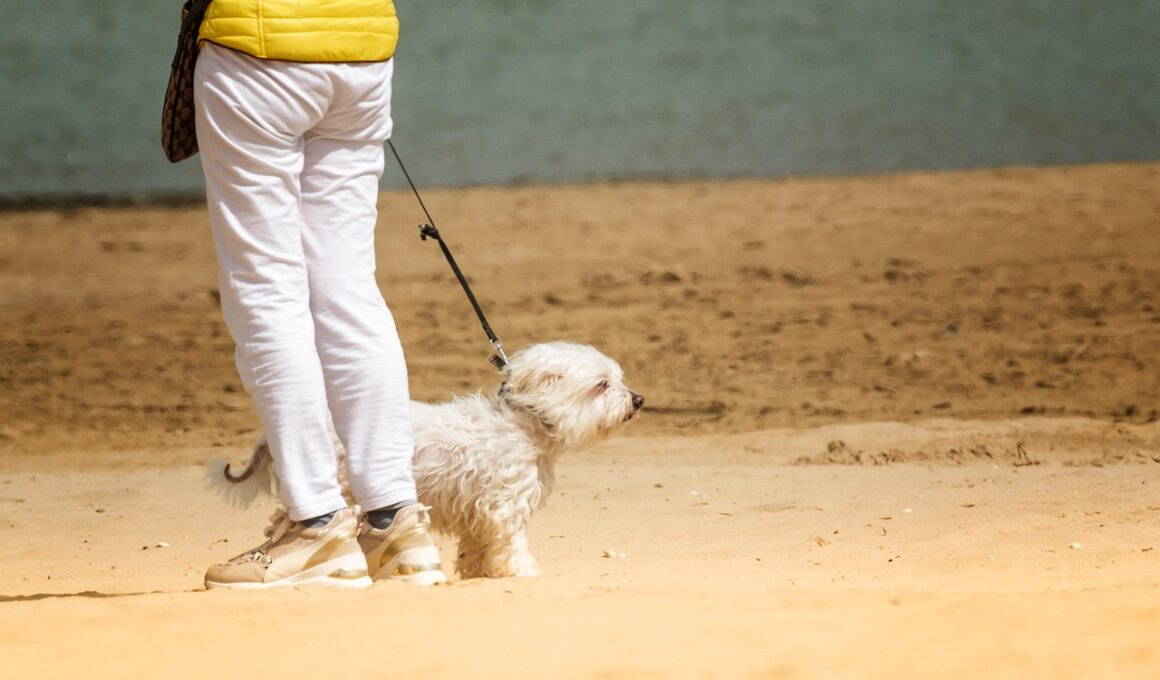How Regular Exercise Improves Your Dog’s Dental Health
Regular exercise is vital for your dog’s overall well-being, including dental health. When dogs engage in physical activity, several physiological changes occur that enhance their dental hygiene. Improving blood circulation is one such change that can help your dog’s gums and teeth significantly. A healthy flow of oxygen-rich blood helps to nourish the tissues in the mouth, promoting recovery and healing. Moreover, regular movement helps to remove food particles from their teeth. This process naturally reduces plaque buildup by thoroughly brushing against the teeth, giving you a helping hand in maintaining dental hygiene. Engaging your dog in plays such as fetching or running can act like a natural toothbrush, complementing routine dental care. Notably, bone-chewing is another enjoyable activity that not only entertains but also cleans their teeth while stimulating gums. When selecting toys for your dog, consider options that promote dental care, like dental chews or toys designed to support oral health. Making exercise part of their daily routine can yield lasting advantages for your dog’s dental health and prevent costly veterinary bills down the road. Ultimately, a proactive approach to dental health leads to happier, healthier dogs for life.
A strong correlation exists between weight management and dental health. Regular exercise not only maintains a healthy weight but also reduces the risk of dental problems. Obesity can worsen dental disease, making it crucial for your dog to engage in daily physical activities. When dogs are overweight, additional stress is placed on their bodies, including their oral health. Regular lunges, jogs, and simple walks can prove tremendously beneficial for achieving a healthier weight. Aside from the physical aspect, mental stimulation is another benefit of exercise that plays a key role in dental health. Engaging your dog’s mind through varied activities can lead to more inclined health behaviors. Dogs can become bored with their routines, leading them to neglect dental care. Innovative activities such as obedience training, agility exercises, or puzzle toys can keep your dog mentally engaged. A varied exercise routine not only provides physical benefits but also aids in developing good habits, including dental care. Remember, dogs that stay active are less likely to face dental disease, leading to fewer visits to the vet. This holistic focus on health promotes a longer and happier life for your furry friends.
Dental disease in dogs is a common issue that often goes unnoticed. Regular exercise can act as a preventive measure against such problems. Physical activity encourages your dog to chew more, decreasing tartar build-up on their teeth. Chewing encourages saliva production, which in turn helps counteract harmful bacteria in the mouth. Saliva acts as a natural defense mechanism against dental issues. It’s crucial for dog owners to recognize signs of dental disease, such as bad breath or swollen gums, so they can act early. Moreover, by incorporating exercise into your dog’s life, you’re likely to boost its immune system and overall health. A robust immune system can prevent infections, including those affecting oral health. Once exercise becomes a habit, it becomes a vital part of their lifestyle. You can take your dog to a park, arrange play dates, or simply play games like fetch. All these activities not only help provide exercise but can also create stronger dogs with better dental health. Frequency is essential; aim for at least 30 minutes of exercise daily to see significant benefits for oral health as well as general well-being.
The Role of Diet in Exercise and Dental Health
Diet plays an equally crucial role alongside exercise when maintaining your dog’s dental health. A balanced diet contributes to healthy teeth and gums, complementing the benefits of regular exercise. Dogs that consume high-quality, nutrient-dense food experience better absorption of minerals necessary for maintaining strong teeth. In contrast, sugary or overly processed snacks can contribute to dental decay and plaque. Therefore, it’s advisable to prioritize your dog’s nutrition, incorporating vegetables and dental treats that promote oral health. Using treats specifically designed to enhance dental hygiene is equally beneficial. While exercising, consider providing your dog with these treats as rewards, ensuring that their calories are well-balanced. Additionally, monitor water intake during exercise; proper hydration supports saliva production, which helps clean teeth naturally. Always ensure that your dog has access to fresh, clean water throughout their day. Nutrition, combined with regular exercise, creates a synergistic effect, delivering a comprehensive approach to your dog’s health. Consider also periodic professional dental cleanings in conjunction with daily care routines. This holistic strategy promotes optimal dental health for your pup, adding years to their life while improving their overall happiness.
Not all exercise is created equal when it comes to dental health. Some activities are more effective than others in promoting oral hygiene. For instance, tug-of-war is one activity that can benefit your dog’s dental health while being a fun bonding experience. This kind of play encourages chewing and pulling, effectively cleaning their teeth along the way. Alternatively, incorporating fetch with chew toys can further provide teeth-cleaning benefits. These toys come with textures designed specifically to aid in cleaning plaque and tartar. Additionally, swimming is a low-impact exercise that can be adapted to suit your dog’s comfort level, allowing them to enjoy exercise without overexertion. However, the key to maximum benefit is consistency; dogs should engage in these types of exercise regularly. Establish a balanced routine that includes a variety of exercises, ensuring that your dog receives comprehensive benefits for dental health and enjoys shared time with you. Don’t forget the significance of routine visits to the vet. Regular professional dental check-ups, combined with exercise and appropriate diet, are crucial for sustaining your dog’s dental health.
Importance of Consistent Veterinary Check-ups
Although regular exercise greatly contributes to dental health, consistent veterinary check-ups are vital. A veterinarian can provide insights that help identify early signs of dental disease, which can go unnoticed at home. Regular dental cleanings, conducted by professionals, are indispensable. They help remove stubborn plaque and tartar that regular brushing and chewing may miss. This is routinely recommended for all dogs, regardless of established dental care. Understanding your dog’s unique needs is crucial as not all breeds are alike. Additionally, early identification of dental issues can prevent more severe complications. Some dogs may experience more rapid deterioration of oral health, necessitating closer monitoring and frequent dental services. Vets can offer personalized advice on daily oral care tailored to your dog’s specific lifestyle needs. Gaining knowledge from veterinary check-ups helps direct owners toward both dental health and exercise, reinforcing a complete wellness approach. On top of that, building a relationship with a trusted veterinarian allows for better communication about any behavioral traits that may indicate underlying health problems. This synergy between routine exercise and professional guidance produces a framework for achieving optimal dental health for your beloved companion.
In conclusion, frequent exercise has far-reaching benefits that extend beyond just keeping your dog fit. The link between regular exercise and improved dental health is grounded in several factors, ranging from increased gum circulation to better weight management. Moreover, maintaining an active lifestyle provides mental stimulation that enhances oral hygiene practices. Consistent positive oral behaviors encompass proper diet, suitable chew toys, and routine dental care that intertwine with the enjoyment of exercise. An active dog is less likely to experience dental issues, which can lead to a happier pet and save owners from costly surprises. As responsible pet owners, it is our duty to ensure that our dogs engage in a combination of fun exercise and proper dental care. Remember that every dog is an individual, so tailor your routines and approaches to match your furry friend’s unique needs. In doing so, your bond strengthens as your dog enjoys healthier living. As we all mutually benefit from an energetic and healthy lifestyle, a proactive approach today paves the way for a lifetime of health for your four-legged companion. Your dog deserves a fulfilling life with strong teeth and vibrant health through regular exercise.
Your dog’s dental health will reflect how you prioritize their exercise and overall well-being. By embracing these habits early on, you can ensure your pet enjoys a longer and happier life.


